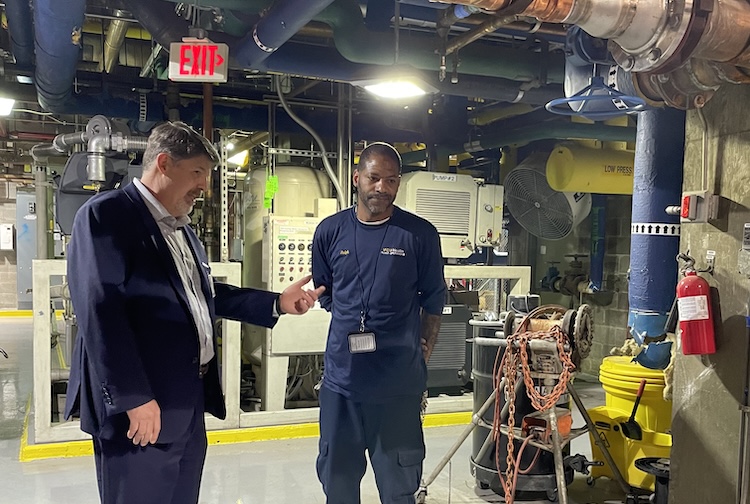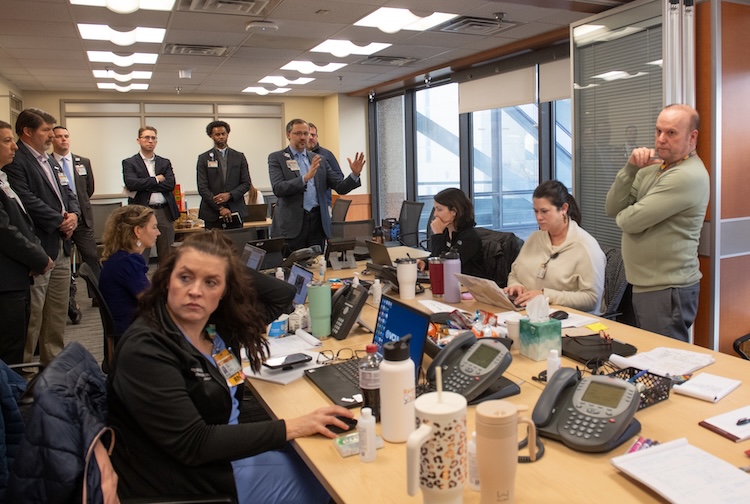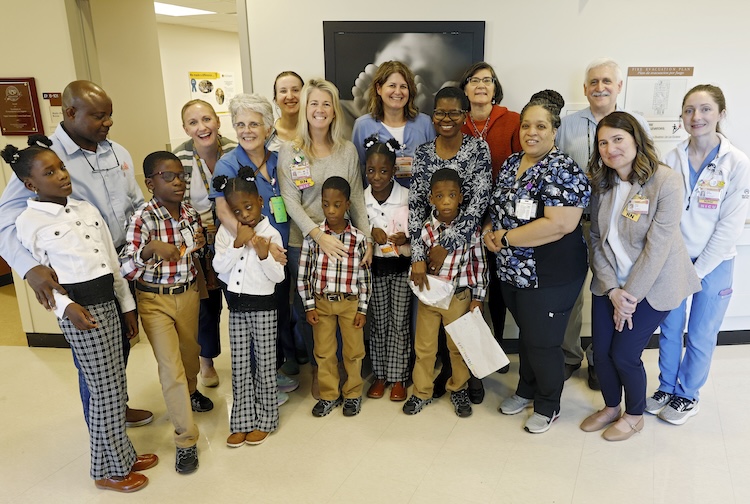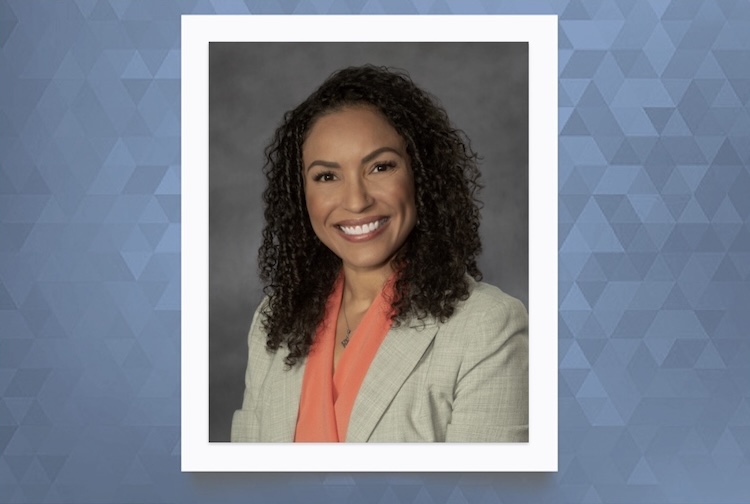Meet the team who kept the water running at VCU Medical Center throughout a week-long outage
The undeniable dedication of VCU Health’s Plant Operations team helps to find innovative solutions to water pressure and sanitation problems, ensuring patients can continue to receive care.
May 13, 2025 Larry Shirts, senior director of facilities for VCU Health (left), oversees the team managing facility operations for all VCU Health locations across Virginia. (Joe Kuttenkuler, Enterprise Marketing and Communications)
Larry Shirts, senior director of facilities for VCU Health (left), oversees the team managing facility operations for all VCU Health locations across Virginia. (Joe Kuttenkuler, Enterprise Marketing and Communications)
By Pete Woody
“If you take any building in the health system and pick it up and shake it, anything that doesn’t fall out, that's what we’re responsible for maintaining.”
That’s how Larry Shirts, the senior director of facilities for VCU Health, describes the role of plant operations for the health system. Shirts directly manages the plant operations and facilities for the VCU Medical Center campus in downtown Richmond, Virginia, and is responsible for the team managing facility operations for health system locations across the state.
And while a week-long water outage, like the one that hit Richmond after a winter storm in early Jan. 2025, is not quite the same as someone picking up a building and shaking it vigorously – it was nearly as disruptive.
The teamwork needed to ensure patients could still receive care at facilities affected by boil water advisories required undeniable dedication, along with unexpected help from a former patient, to solve the challenges that arose.
‘We had to find a solution’
With more than 20 years in health care facilities management, Shirts knows that anytime inclement weather is in the forecast he needs to be on the lookout for potential impacts to facility operations and patient care.
“Watching the weather, for plant operations, it's more than just a hobby. And I will tell you that the last thing you think about is whether the city is going to lose its water supply,” Shirts said, before offering a correction. “It used to be the last one. Not so much anymore.”
(Joe Kuttenkuler and Taylor MacKillop, Enterprise Marketing and Communications
The reason this is the case is now well known: A winter storm caused a malfunction at the City of Richmond’s water treatment plant on Jan. 6, 2025, leading to widespread water outages and boil water advisories for several counties in Central Virginia. Along with more than 225,000 people in the region, VCU Health facilities were also affected for more than a week.
Shirts says his team noticed a slight reduction in water pressure during the day and in the process of trying to figure out what was happening, they started to hear about a problem with the city’s water supply. Over the course of the afternoon and early evening, they didn’t see any signs of improvement, despite initial assurances that it would be solved quickly.
“That's really when we started making more serious plans about what to do,” Shirts said.
Even though it was very early in the process, his team was already discussing the impacts of an extended water outage. Everyone recognized the seriousness of the situation. Some who clocked in for their shifts at 6 or 7 in the morning stayed past dinnertime to help. Within the first 24 hours, Shirts even racked up more than 22,000 steps. And like many VCU Health employees working long hours during the crisis, many on his team didn’t have clean running water to go home to.
I've never in my entire career seen a group of professionals lose their egos so quickly and just solve the problem. It was an amazing thing to see. That level of dedication and commitment to service was just remarkable.
Larry Shirts, VCU Health's senior director of facilities
The health system’s incident command center was activated, bringing together leaders from across VCU Health and Virginia Commonwealth University to coordinate a response. With freezing temperatures in the forecast for the next several days and nights, discussions began to focus on the worst-case scenario: a lack of reliable water to supply the steam plants that provide heat to the medical center and its 700-plus patients, as well as other health system buildings in downtown Richmond.
“It became quickly apparent to everyone in the room that it would mean an evacuation if we couldn't heat the building,” Shirts said. “We had to have a plan within just a few hours for the worst case. But we also knew that it was just not an acceptable option. We had to find a solution.”
A multifaceted approach to solving problems
‘Nothing to see here’ is the motto, Shirts says, of the 134 people who work on the plant operations team.
“The idea is not that we don't want you to know what we're doing,” Shirts explains, “It's that we don't want you to know there was ever a problem.” And for that to be the case, he says, they identify what the issues are and resolve them in a way that means there's no impact on others.
The first issue to solve was continuing to supply water to the medical center steam plant. Work stretched into the early hours of Tuesday, Jan. 7, as Shirts and his team analyzed every aspect of the medical center’s water and steam delivery systems.
“At 3:30 in the morning on Tuesday, I sent out a text to nine senior members of my team to see who was available to answer a problem, and they all responded. It was an amazing experience of recognizing how dedicated and service-oriented my entire team is,” Shirts said.

VCU Health’s incident command center was activated during the water disruption in January 2025, bringing together leaders from across the health system and Virginia Commonwealth University to coordinate a response. (Tom Kojcsich, Enterprise Marketing and Communications)
The plant operations team took a multifaceted approach to the mechanical solutions. And fortunately, thanks to their colleague Cody Deschenes, the team also had some recent experience with restoring the water supply to a hospital.
Deschenes, the facilities director at VCU Health Community Memorial Hospital in South Hill, Virginia, traveled to Augusta, Georgia, in the aftermath of Hurricane Helene to support recovery efforts at Piedmont Summerville Hospital after the water supply was disrupted due to flooding.
Deschenes served as infrastructure recovery liaison, deploying temporary water tanks and coordinating with the National Guard to ensure water was delivered to the hospital. Though the cause for the Richmond water outage was different, Deschenes’ experience in Georgia helped shape the team’s approach.
“The most critical aspect was ensuring the hospital-maintained pressure in the water system for essential operations, like sterilization and patient care,” Deschenes said. “Identifying alternative water sources and implementing conservation strategies quickly were key to keeping operations functional.”
The first step for ensuring water pressure involved creating as many new connection points within the existing pipes as possible, to be able to pump as much water as the facilities needed to operate. According to Shirts, that’s roughly 30,000 gallons an hour under normal operations.
“With the connection points we had, we knew we were only going to be able to push about 7,000 gallons maximum. And we also knew we needed to distribute this heat across multiple buildings,” Shirts explains. “So, the first thing we had to do was make all those cross-connections so the locations that didn't normally feed each other now would.”
I've done the same job for very large health systems. There's something special here right now with the plant operations team.
Larry Shirts, VCU Health's senior director of facilities
As this work progressed, it became clear that plant operations needed to devise a new system that could meet the full volume capacity of the hospital in the event of any future water outages. Deschenes’ experience in Georgia was important for this as well, as he had helped design a temporary water rerouting system at Piedmont Summerville Hospital.
In Richmond, the plan revolved around having tanks separate from the building that were large enough to fill with potable water to pump into the building.
The team got to work, fabricating two new pipes and installing them outside the main hospital building near the intersection of E. Marshall Street and 13th Street. They were connected to the system inside the building, allowing for the supply of the correct volume of water at the correct pressures.
Deschenes also learned from his time in Georgia that switching between water trucks pushing potable and non-potable water into a building can cause sanitation challenges. To avoid this potential problem, the health system only sourced trucks with potable water.
“The first truck we received was from the Goochland Fire Department. They stepped up to support us,” Shirts said, recalling the outpouring of support from the community. “Shortly after that, we had multiple companies that were sending trucks. And we basically lined them up one after the other on 13th Street. As fast as one could force the water out, then the next one would pull up.”
A former patient, inspired to give back
The decision to only use potable water also allowed the health system to get a head start on testing the water quality.
“And this was done so that we would know well ahead of the city or anyone else that our water was fully sanitized,” Shirts said. “We made a decision to do everything we can to keep our systems as clean as we can and to continuously test so that we know exactly when our water is safe to use” for VCU Health’s patient care standards.
And how many tests would ultimately be necessary? “We did about 300 chlorine tests, and then it was over 200 samples that were sent to a lab,” said Rick Mann, director of facilities for VCU Health and the point person for water testing during the crisis.

While Larry Shirts and his team were trying to keep the water running at VCU Medical Center, other VCU Health employees were helping to distribute drinking water to both patients and colleagues. (Tom Kojcsich, Enterprise Marketing and Communications)
The chlorine tests were done on-site, while an independent lab was used for additional biological and sanitation testing.
Shirts said the lab agreed to stay open as long as it was necessary for the testing to get done.
“We tested endlessly. Every three hours, we were pulling samples across dozens of locations,” Shirts said. “They stayed open through the weekend to continue to test for us.”
It wasn’t until after the boil water advisories were lifted that they learned why the lab stayed open all those extra hours to help. The lab owner was inspired by his unique connection to VCU Health: he was a former patient who received treatment at VCU Medical Center.
“This gentleman sent a very nice letter saying it was such an honor to support VCU health through this process. He had spent weeks in the hospital here, and VCU Health had literally saved his life. And the reason why the lab agreed to stay open and to support us the way they did was because of his personal story,” Shirts explained. “When he heard about [what was going on], he couldn't wait to jump in and support us. It gave me chills reading the letter.”
“He said that that was his way of paying back and giving something back to VCU Health,” Mann added.
‘The right group in the right place at the right time’
Thanks to the support of the lab for their testing efforts, Shirts said his team was confident their water supply met the standard for patient care even before the city lifted the boil water advisory on Saturday, Jan. 11, but they continued to test for added measure. And though the lifting of the advisory was a moment to savor, there was still plenty of work to do.
“Every possible component that we have that you want to keep clean was dirty in some fashion,” Shirts said of the cleaning and sanitation work that continued. “The team had to accelerate our pace of operations. It took us a good two weeks after the point everyone else was saying we're done before we really slowed down.”
As he reflects on the massive water disruption and recovery process, Shirts said it was "the right group, in the right place, at the right time,” who helped to navigate these huge challenges.
“The knowledge base that I have on my team is as good as any location in the entire nation. I've done the same job for very large health systems. There's something special here right now with the plant operations team,” Shirts said, before praising the role that health system leaders played throughout the week.
“And then, you take that and expand it to the larger team that was in the incident command center. I've never in my entire career seen a group of professionals lose their egos so quickly and just solve the problem. It was an amazing thing to see. That level of dedication and commitment to service was just remarkable.”
How VCU Health team members responded to the water disruption
Inspired by this story? Read more about our patients and providers




